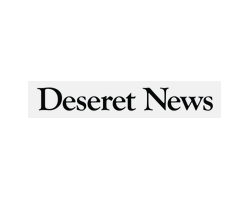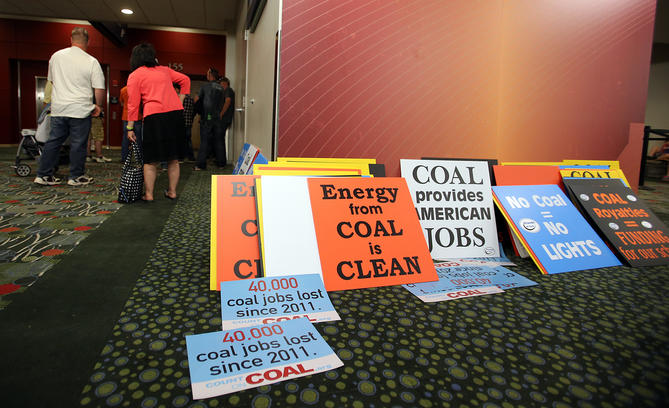Hundreds of Utah Coal Miners Speak Out on Proposed Federal Reforms

By Amy Joi O'Donoghue
May 20, 2016 - Frustrated coal miners, coal company executives and truckers who haul coal swamped a daylong public meeting Thursday on proposed reforms to the federal coal lease program, urging a three-year moratorium on new coal leases be overturned and reform efforts dropped.
"Growing up, I never thought the biggest threat to my job would be my government," said Phillip Jensen, an engineering tech for Utah American Energy. "But here we are. God help us."
Jensen, who drew chuckles from sympathetic colleagues when he first addressed Bureau of Land Management officials in Russian, saying he forgot what country he was in, added that the agency's proposed overhaul of its coal leasing program is simply a contrived attempt to ruin the industry.
"It is just another scheme to attack coal and (the BLM) has been perverted into a political weapon," he said.
Thursday's hearing at the Salt Palace Convention Center is among six the federal agency is convening across the country as it begins a discretionary environmental review aimed at modernizing rules and regulations that govern mining of coal on federal lands.
The rules were last updated in 1979, and concerns raised by the Interior Department's inspector general and the General Accountability Office question whether taxpayers are receiving fair market value from the sale of coal.
Interior Secretary Sally Jewell has said the federal coal leasing program lacks transparency and competition, and the impacts of coal production and combustion have not been contemplated in the face of climate change.
Coal critics assert the undervaluing of the commodity has cost U.S. taxpayers $30 billion over the past 30 years, and coal mining in the Powder River Basin region is responsible for 13 percent of U.S. emissions.
"We need to move to a world beyond coal," Sharon St. Joan said during Thursday's public hearing. "A coal future is a mirage, shimmering in the distance."
According to the BLM, the agency manages 308 coal leases across the United States, and over the past decade, leases have produced 4.3 billion tons of coal at a value of $63 billion. Coal accounts for one-third of the nation's energy needs, and of that, 44 percent is generated from coal produced on federal lands. The majority of that — 88 percent — comes from the West.
As it begins its review of the federal coal program, the BLM said it is going to look at seven key areas that include royalty rates; where, how and when to lease; the effect of the coal leasing program on national, state and local economies; and how the agency can best assess climate change impacts.
The Salt Lake City hearing is part of the initial outreach period for the agency to gather input on what considerations should be built into the review.
Several elected officials roundly criticized the BLM for holding the hearing in Salt Lake City rather than in Utah's coal country where any reforms will have the most impact.
"The invitation to come to Carbon, Emery, Sevier and Sanpete counties is always open," said Carbon County Commissioner Jae Potter. "You picked the wrong location to look into the eyes of the people who are affected by the overreach of the federal government."
Despite the distance, however, several hundred employees from mining companies such as Bowie Resources packed the meeting room at the Salt Palace. BLM officials had seats for a little more than 500 people, but they estimated 50 to 100 more people attended.
Multiple people urged reversal of the federal three-year moratorium on any new coal leases announced in January.
"A three-year moratorium on leasing of coal reserves is absolutely unnecessary," said Kenneth May, general manager of Sufco Mine. "It is in my opinion another attempt to affect coal mining, which does not need a major reform and certainly does not need a full stop."
Laura Nelson, executive director of the Governor's Office of Energy Development, said the state is exploring its legal options in reaction to the "unjustified" moratorium.
"The BLM’s decision to halt leasing while they review the program is an egregious violation of its fiduciary duties to its beneficiaries — the citizens of the U.S., including those in Utah," Nelson said, adding that it threatens several major coal mine expansions in the state.
"The BLM’s coal leasing moratorium is a rushed and uninformed political decision that unnecessarily threatens Utah’s coal industry and the many benefits that industry provides," she said.
Multiple organizations critical of coal have praised the Interior Department for the moratorium, saying it is a long overdue action to remedy a broken program in drastic need of overhaul.

Signs supporting coal production are left outside a scoping meeting to discuss possible U.S. Department of the Interior coal mining reforms at the Salt Palace Convention Center in Salt Lake City on Thursday, May 19, 2016

